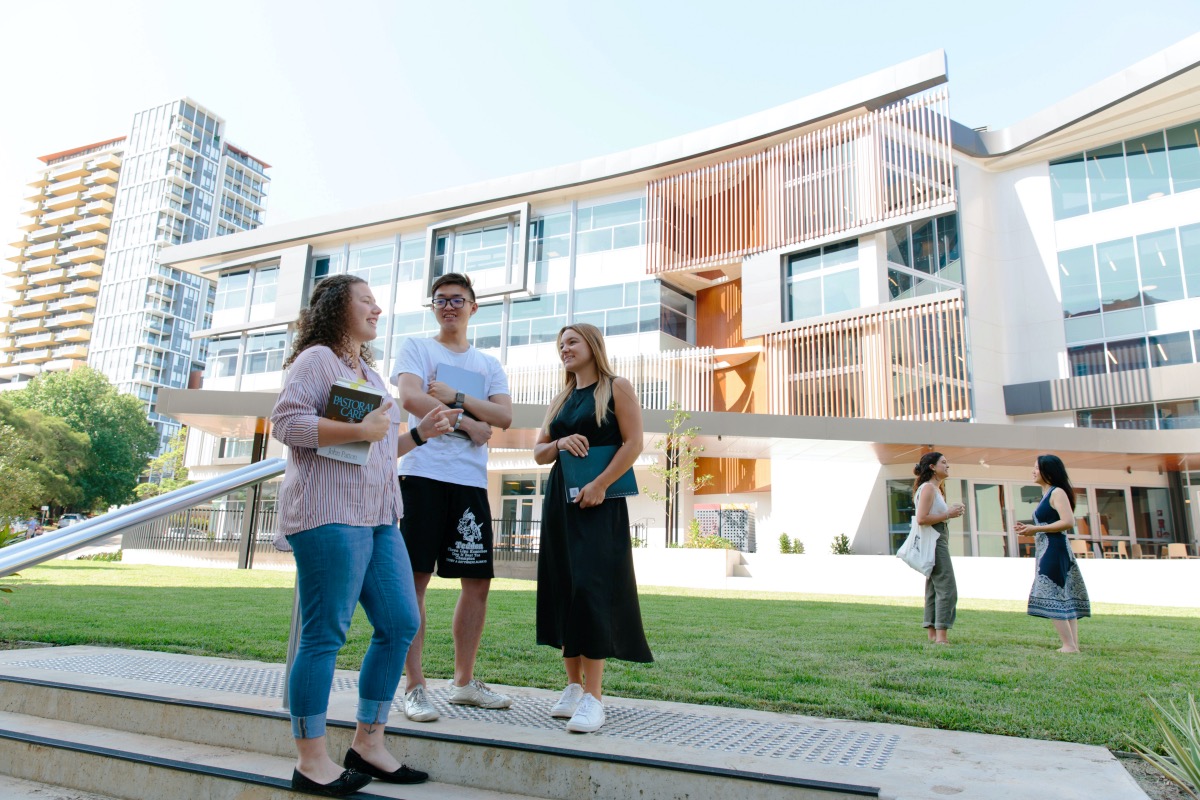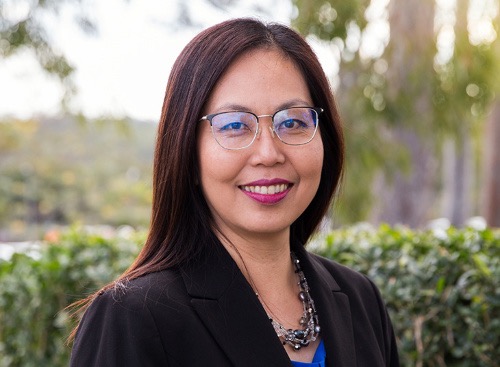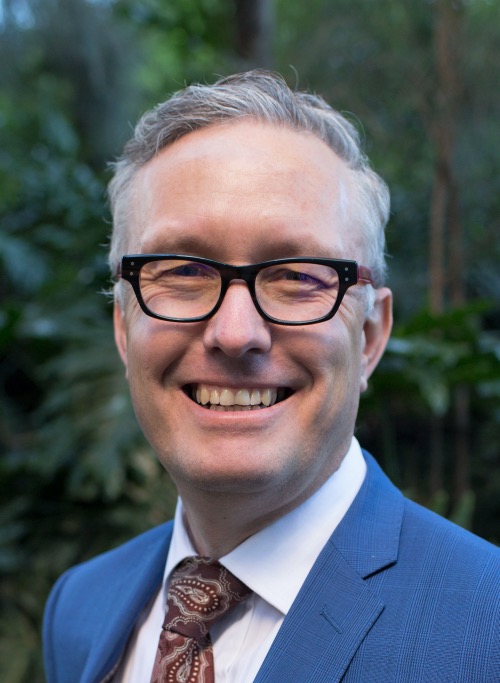
JO KADLECEK reports on how a small but growing number of Christian students in Australia are looking for Christian alternatives in higher education…
Sydney, Australia
When Jude Keene was growing up in rural Victoria, he loved storytelling so much he joined a community theatre. For seven years he performed, helped with productions and even taught in a youth theatre program. So when the home-schooled student finished his studies, he knew he wanted to go further in acting.
He auditioned and was accepted at a dramatic arts academy in Melbourne, but during his first year, he was asked to take on roles he said he, “wasn’t comfortable with as a Christian”. He began to consider his options when he discovered what he calls, “the only Christian uni in Australia that offered a degree in dramatic arts”. He auditioned and transferred to Sydney’s Excelsia College.

Arts student Jude Keene performs in a play at Sydney’s Excelsia College. PICTURE: Supplied.
“Studying dramatic arts in Melbourne was the dream at the time, but there was no place for my faith,” said the 22-year-old second year student. “It was good in that it forced me to make a stand on what I believe and made me think about what stories I do want to tell, those with meaning that are God-centred.”
Keene is part of a small but growing number of Christian students seeking an alternative to higher education in Australia. For those who believe they’re called to a particular vocation but see neither Bible college (which offers training only in formal ministries) nor public universities (which are often not sympathetic to a Christian world view), Christian higher education seems a viable solution.

Dr Jeannie Trudel. PICTURE: Supplied
“The impact of Christian higher education is still in early stages because it’s not well known or well adopted, like in the US…But when we look at the number of graduates from our Christian higher education institutions, we do see a growing impact, especially in the fields of education and counsellling.”
– Dr Jeannie Trudel, president of Christian Heritage College in Queensland.
Formed in 2017, eight institutions now comprise the Australia Christian Higher Education Alliance. Presidents, CEOs and other ACHEA leaders meet two to three times a year to explore common challenges, best practices and advocacy issues around religious freedom. With a range of theological perspectives that include Baptist, Pentecostal, Seventh Day Adventist and nondenominational affiliations, these member institutions promote accessible class sizes, engaged professors and courses such as teacher education, business, arts, theology and social work—all with an emphasis on calling, faith, purpose, growth or transforming the world.
Four of the members of ACHEA, including Excelsia College, are in New South Wales and include Alphacrucis University College, Avondale University and Morling College. Others are Christian Heritage College in Brisbane, Eastern College Australia in Victoria, Sheridan Institute of Higher Education in Perth, and Tabor College in Adelaide. As of 2020, a total of 7,633 students were enrolled across the various campuses.
“The impact of Christian higher education is still in early stages because it’s not well known or well adopted, like in the US,” said Dr Jeannie Trudel, president of Christian Heritage College in Queensland. “Most of the public universities here were not founded on faith so there’s no actual foundation from which to grow. But when we look at the number of graduates from our Christian higher education institutions, we do see a growing impact, especially in the fields of education and counsellling.”
Trudel said that because these private institutions do not generally qualify for government funding, they remain small with limited budgets to market domestically through networks such as churches or Christian schools, though some have focused on recruiting international students. “There’s a lot we can do, especially when there’s such a strong purpose and mission in Australia,” she said. “The rewards are huge and the impact is eternal, because Christian higher education can help people transform our society.”

Students at Morling College, a Baptist college in Sydney. PICTURE: Supplied.
Even so, the perception problem is not an easy one to overcome. Though 40 per cent of Australian students attend religiously affiliated secondary schools, parents often believe their children need to attend prestigious public universities – like those in the Group of Eight – if they’re to be taken seriously in their professions, according to Kara Martin, author and faith and work consultant/adjunct lecturer with ACHEA member schools as well as Gordon Conwell Theological Seminary in Boston.
“Christian higher education is not a natural fit for most Christian parents who often see public universities as higher quality, having a broader range of resources, funding, and areas to study,” Martin said. “It’s also problematic that there’s not been a lot of research on how ACHEA schools integrate faith in these areas. So while they might be teaching these subjects well, they then require Biblical integration classes rather than bringing a whole of life perspective to the classroom to understand how faith applies to all of life.”
Martin says part of the problem is that churches often don’t show how faith is relevant to their work life, and instead continue to reinforce what she calls “the sacred and secular divide.” What would lead to a broader impact, she says, is if pastors, churches and Christian higher education recognised the opportunity they have to bring a holistic approach to work and faith, especially because she believes today’s young people want such guidance to see all of their lives through the lens of faith.
Professor Dr Kirsty Beilharz, director of mission and director of research, graduate programs, at Excelsia College, agrees. She says many students in their early twenties tell her they are thinking about contentious ethical issues or spiritual meaning for the first time in their life. They realise it takes time, introspection and critical thinking to arrive at an understanding of meaning and purpose in their lives.
“That’s why we intentionally do not tell people what to think, but rather give them tools and resources to learn how to think,” Beilharz said.
Nonetheless, the challenge is great for recasting Christian higher education as viable alternative to preparing students for their futures. But Beilharz believes Christian higher education offers a safe place where academics can still interrogate societal attitudes and ideas without feeling marginalised.

Dr David Hastie of Alphacrusis University College. PICTURE: Supplied.
“It often feels like Christian higher education is trying to present a balancing countercultural perspective, at least in Australia,” Beilharz said. “The trends in loud media and societal voices are increasingly secular, capitalistic, fast, superficial, and to contemplate deep, spiritual, lifelong-serving thoughts and competencies will be neglected without purposeful intervention in education.”
For that kind of “purposeful intervention” to occur, though, according to Dr David Hastie, deputy vice president and associate professor of education at Alphacrusis University College, innovation will be key both to strengthening Christian higher education and to ensuring the place of Christian faith in intellectual life.
“When you look at the huge volume of Christian organisations in our society, in health care, social services and aged care, I think there’s a strong case for Christian tertiary education yet many are working without funding,” Hastie said. “It’s innovation or die. [Some] 1.4 million children attend religious schools, far outweighing the number of children in church, so in some ways, Christian schools are becoming the proxy church and teachers are the new clergy.”
We rely on our readers to fund Sight's work - become a financial supporter today!
For more information, head to our Subscriber's page.
As a result, Hastie is helping Alphacrusis create a stronger teacher education training hub to provide what he calls, “a pipeline of ethos-aligned staff for religious institutions”. Other ACHEA schools are also offering teacher training and education degrees as well as communication and business degrees with a vision for impact. Trudel knows of one business school graduate who’s now starting a Christian school because, as she says, “it’s not just a job. It’s about making a difference and having a calling.”
For students like Keene, he admits that having Christian higher education on his resume might not open doors, but he says he has no regrets about his move to Excelsia. He appreciates the Christian foundation, one which he can fall back on, and says he’s had important conversations that have made it worth it.
“You’re more likely to find like-minded persons here than somewhere else,” he said. “And since the arts are at the forefront of where the world is heading and shaping our world today, it’s an important place for Christians to be. So finding other Christians [here] is a safety net when things become crazy.”
Corrections: The percentage of children attending religiously-affiliated schools has been corrected as Dr David Hastie’s quote concerning the number of children attending religous schools and his title.The spelling of Professor Dr Kirsty Beilharz name has also been corrected.






